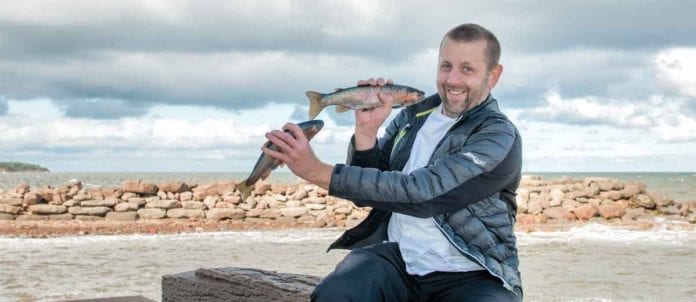Shane Robilliard says he’s a lucky man. “Most chefs start their day picking up a coffee. I get to go fishing,” says the director of Food and Beverage at Fox Harb’r Resort in Wallace, N.S. “Seafood doesn’t get more sustainable than that.”
Robilliard is the purveyor of the five-star resort’s Cape Cliff Dining Room, which has the distinction of being Atlantic Canada’s first seafood restaurant to be Ocean Wise-certified. It’s all part of an overall sustainability play on the expansive property overlooking the Northumberland Strait.
Long passionate about sustainable food practices, Robilliard came to Fox Harb’r for the 2015 season from B.C. following a successful career with Fairmont properties in Vancouver, San Francisco and Whistler. He also served as chair of the BC Restaurant and Foodservice Association until 2010, when he moved to Halifax.
“My drive, my philosophy, is 100 per cent using locally sourced, fresh, seasonal ingredients,” he says. “Growing up on the west coast it was all about protecting seafood stocks and the oceans. So it’s something I’ve always been excited about and wanted to be a part of.”
When time allows, Robilliard’s first order of the day is to visit one of the property’s well-stocked trout pounds for a few relaxing minutes of fly fishing. Each pond is home to upwards of 3,000 female fish, of which he only captures about 300 per season. “Since they are not a native species, we don’t want them to propagate,” he says.
This year the resort added 1,100 trout to the pond, which are purchased from North River Fish Farm in nearby Truro. Robilliard likes to keep his food preparations relatively simple, letting the beauty and freshness of the seafood shine through in dishes such as pan-seared trout served with couscous and beurre blanc vegetables.
The Cape Cliff Dining Room, which operates from May 1 to Oct. 31, is a 90-seat restaurant serving breakfast and dinner. It features an ocean-themed blue-toned decor, with floor-to-ceiling windows offering panoramic views of the golf course and sea coast. “I would challenge anyone to find a nicer view in Atlantic Canada,” he says. Robilliard also oversees The Willard, a small home-style kitchen and 40-seat dining setting in the Sporting Lodge, as well as in-room catering.
Cape Cliff opened 15 years ago during the original construction of the site, but only received its sustainability certification this year following Robilliard’s arrival. While initially the clientele tended to be resort guests, the restaurant is slowly building a larger base of customers. “We now have a 10-year plan in place to grow the resort and the restaurant operation,” he says. “This year, business is up 20 per cent over last year, and we’re super happy about that.”
Depending on availability, the expansive menu includes pan-seared fresh Digby scallops, bay oysters on the half shell, Atlantic salmon Carpaccio, lobster timbale or ravioli, sesame-seared loin of albacore tuna, line-caught halibut, maple-smoked trout or Robilliard’s signature seafood chowder and lobster bisque. During lobster season, Robilliard is happy to cater a traditional boiled-lobster dinner — complete with favourite down-East desserts such as blueberry grunt or strawberry shortcake made with wild berries picked locally. Robilliard even makes his own preserves. Prices range from $35 to $55 for mains; $15 to $21 for appetizers; and $12 for desserts.
Not only does the menu feature spectacular seafood, but also vegetables grown in the property’s own greenhouses. “Our menu is varied,” Robilliard explains. “We raise our own pheasants and we offer beef, chicken and other proteins.” The restaurant also boasts one of the best wine lists in the province and has been a recipient of a Wine Spectator Award of Excellence.
Since coming to the East Coast, Robilliard has worked to build the Ocean Wise brand and overall awareness of sustainable fishing practices. “The East Coast has certainly seen examples of what can happen when you don’t take care of fisheries — the collapse of the cod and wild Atlantic salmon populations.”
The Maritimes’ lobster fisheries are an interesting dichotomy, he says. “This region operates one of the world’s most well-managed, sustainable fisheries on the planet. That’s a totally opposite side of the picture.”
Although Ocean Wise only requires one sustainable seafood item on the menu, Robilliard is determined to find suppliers across the board — from lobster to caviar. “I don’t serve any seafood that isn’t Ocean Wise. The good news is, it’s becoming easier to get suppliers as word gets around and I keep adding items as I find them,” he says.
His lobster is delivered by Chase’s Lobster Limited in Pugwash, N.S., while he sources caviar from Acadian Caviar Limited in New Brunswick. He has also managed to find a local supplier of farm-raised scallops (Indian Point Mussels) and another for Atlantic salmon, Sustainable Blue. “What makes Sustainable Blue unique is the fish are raised on land in salt water tanks,” he explains. “There’s no way these fish can escape and mingle with wild salmon. That prevents potential parasites and diseases from affecting other fish. The other benefit is that in ocean pens, only seven per cent of feed is consumed and the rest falls to the sea floor. In a contained unit, water is recycled so there’s no waste going into the oceans.” For lobster, Ocean Wise stipulates one trap per line compared to the typical three. “That helps to prevent by-catch or traps breaking free,” Robilliard explains.
He only buys farmed scallops because the harvesting process prevents by-catch and destruction of the ocean floor caused by dredging.
Given the bounty of seafood in the region, one would think tapping into sustainable suppliers would be simple. Yet Robilliard says he has faced significant challenges. “Everything is hard to get here — we’re two hours from anywhere. So our weekend order has to serve as our week’s supply.”
Orders are placed on Sunday — allowing two days for harvesting — and delivered on Wednesday. “Fish is never out [of the water] more than 24 hours before it gets to me,” he says.
Competition for sustainable products can also be fierce. For example, according to Ocean Wise guidelines, swordfish must be harpooned. But the local fishery only lands around 600 a year, and people pay more than what they’re worth, Robilliard says. “As soon as they land, they’re off to Maine. So even a product caught right here has more attractive markets outside the province.”
Robilliard often turns to company reps, such as Halifax-based Afishionado, which runs a seafood retail and wholesale program. Owner Hana Nelson says Ocean Wise is starting to gain recognition in the area. But that doesn’t mean suppliers are not following Ocean Wise practices.
“Some products we carry are Ocean Wise farmed but haven’t had an official assessment done. There’s not as much brand recognition here, but we’re working on developing that awareness and working with restaurateurs and suppliers to help them understand what [the brand] can do for their business.”
She confirms that getting local product before it moves outside the region can be difficult. “It’s a challenge in the Maritimes to grow premium markets. Most products get exported to areas willing to pay for that quality.”
However, chefs and consumers alike are becoming more aware of what they have in their own backyard and how to celebrate it, she says. “There’s a big push for products that are fished in a way that they want them fished and farmed. People want to know where their products are coming from and how they are treated.”
Suppliers themselves are gaining stellar reputations and helping the cause. “For example, there’s no other product like Sustainable Blue salmon on the market in North America,” Nelson says. “It’s completely contained and 98 per cent of the water is recirculated — that’s far different from what is happening in open-cage pens. The only other land-based salmon farm that I know of is Kuterra on the West Coast.”
Robilliard says he’s still in the early stages of spreading the word about Ocean Wise. “We’re really starting to build a reputation locally. It’s important that chefs, and the people who supply the food, take the steps needed to help protect our ocean stocks.” Next year, he is looking forward to hosting one of his food heroes, Ned Bell, now the corporate chef for Ocean Wise, who spends a great deal of time travelling across Canada raising awareness for sustainability and fish stocks.
Bell, who is also the founder of Chefs for Oceans, says chefs hold a great deal of power in this quest. “Chefs are like doctors — people believe what they say because they are directly connected to the food we love. Guys like Shane are doing a fantastic job of getting people to listen and is certainly a leader in Eastern Canada from a culinary perspective.”
Volume 46, Number 6
Written By Denise Deveau


















